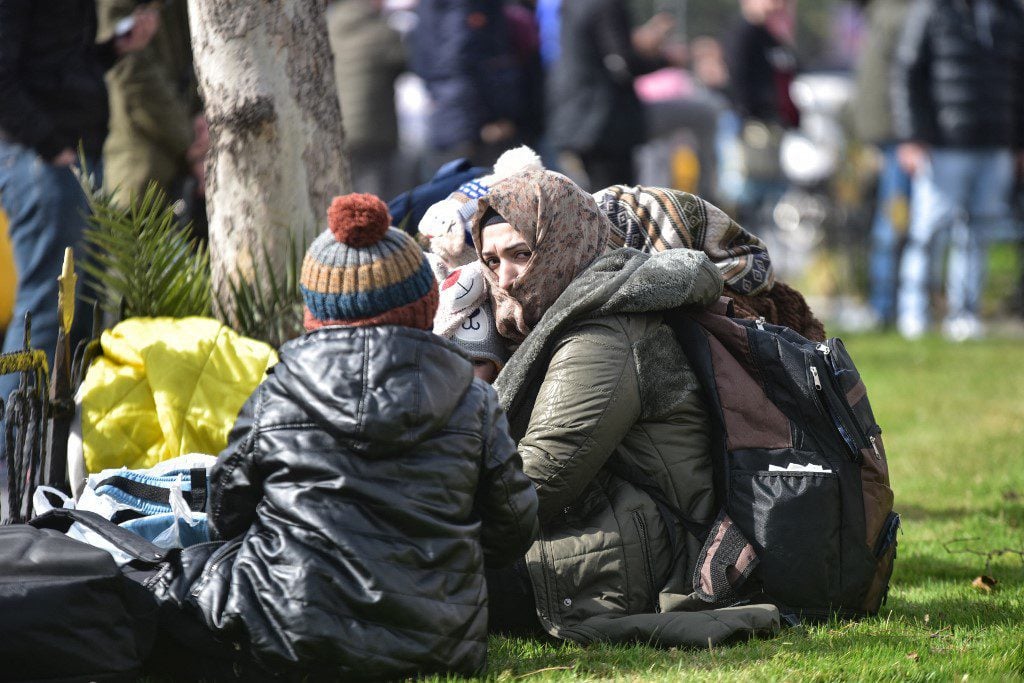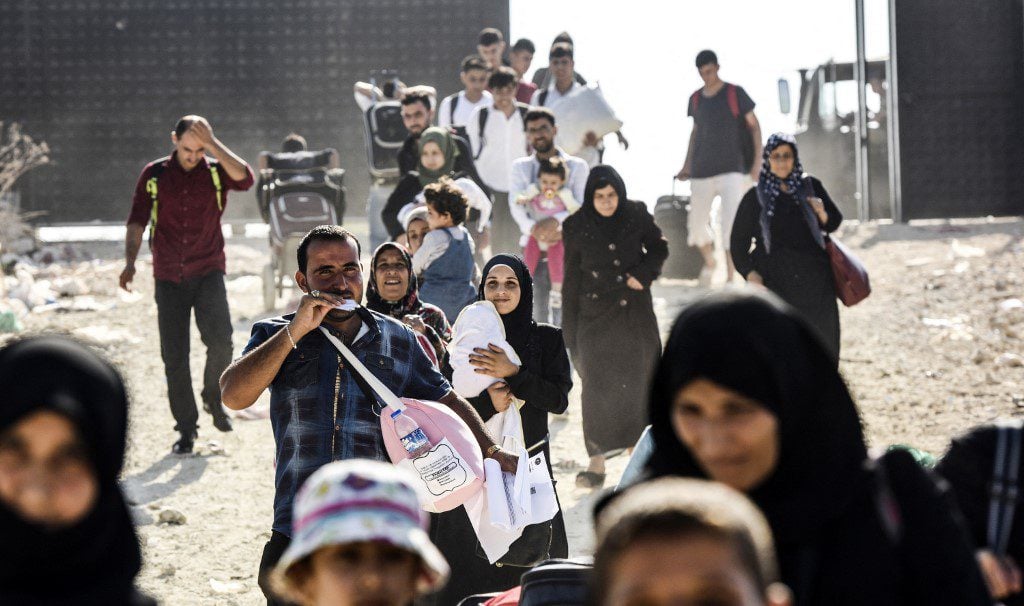
Alaa Amer
Syrian refugees in Turkey live in fragile conditions amid strained relations with a broad spectrum of Turks who continue to use the Syrian presence in their country as an electoral card and as an excuse for economic failures.
On August 12, 2021, Ankara witnessed violence against the Syrians in the Altındağ district, against the background of a quarrel between Syrian and Turkish youth, which resulted in the death of a Turkish teenager. Therefore, the Turkish demonstrators poured their anger on the Syrians living in the neighbourhood, attacking their homes, cars, and workplaces.
The president of the Turkish Red Crescent, Dr Kerem Kinik, tweeted his condolences to the family of the Turkish teenager who lost his life due to that quarrel with a picture of a Syrian child who was injured. “Let us put out this fire as it will not benefit anyone,” he commented. The Turkish Red Crescent posted a video showing Turkish youth throwing stones at Syrian homes. The post came with the following question: “Is there in any of our traditions that call for stoning homes of other people at night? Many refugees contacted us and said that they fear for the lives of their children.”
An Electoral Card
Syrians marvel at the ability of Turks to patiently stand while smiling in the queues in which they line up at the doors of the metro and public transport buses or in front of cashiers in the supermarket, comparing the civilized Turks to the chaos of Syrian queues in which crowding is considered clever. But a number of these same Turks, backed by the power of the public, turned into angry crowds burning shops and goods of Syrians, throwing stones at their windows, and smashing their cars.
In this context, French historian and physician Gustave Le Bon says about the psychology of the crowds: “When a person joins a crowd, he becomes hypnotized and excited about simple ideas as a result of incitement and contagious emotions, which may push him to do things that he would not have dared to do if he was alone, such as destruction, sabotage, and aggression”. A series of hate speeches spewed by preceded and followed the incident in Ankara. Some Turkish politicians and officials turned Syrian refugees into scapegoats. In a series of hate speeches that preceded and followed the incident in Ankara, these politicians claimed that Syrians are the essence of all the economic and social conditions that Turks have been complaining about in recent years. They turned the deportation of the Syrians into an electoral promise, and they misled the Turkish street that the departure of the Syrians would eliminate all of Turkey’s economic problems!
Hate Speeches and Racist Promises
The Syrians heard recently of the mayor of Bolu province Tanju Özcan after he recently showed his hostility to the presence of Syrian refugees. Özcan proposed to the Bolu city council imposing fees ten times more than what the Syrians used to pay for their water bills.
The opposition CHP member added: “They didn’t leave when we cut aid from them and stopped giving them work permits, so we have now decided to take new measures. They have overstayed their welcome. If I had the power, I would send municipal officials to force them out!”
According to the official data of the Turkish Directorate of Migration Management, Bolu hosts only 1,500 Syrians. The mayor of this province posted on his Twitter account to mock that Some Syrians believe they have become Turks once they obtain Turkish citizenships. “You Syrians have crossed the line”, wrote Özcan, “You may become everything on this earth except being Turks.”

Özcan does not sing out the CHP’s tune. The leader of the opposition party, Kemal Kılıçdaroğlu, pledged in a video to return the Syrian refugees to their country, as part of what he called a plan, which he promised to implement successfully within two years. Kılıçdaroğlu explained that his plan will be applicable in 2023 if he becomes president. According to him, 2025 will be the year to accomplish the plan. Regarding the details of the deportation plan, Kılıçdaroğlu said: “I will obtain funding from European Union countries to build schools and companies for Syrians inside Syria.”
That comes at a time when İlay Aksoy, a member of the İYİ Party, and her former counterpart, Ümit Özdağ, joined the chorus of politicians who hate the Syrians and agitate the masses for their expulsion. Aksoy calls for returning the Syrians to their country, warning that Turkish shops will be full of Syrian products. According to her claim, Syrians have a negative economic impact on the Turkish merchants.
During his visit to the border city of Antakya with Syria, Ali Babacan, leader of the DEVA Party, said: “The Syrian solution is in Syria, not in Turkey. For peace and stability to prevail, Turkey must be part of the solution. However, Turkey is nowadays part of the problem. There must be a clear Turkish strategy on Syria”. Babacan indicated that Turkey “needs to talk to all parties in Syria.”
Babacan, Erdoğan’s old friend and new enemy, called on the current Turkish government to withdraw from being a party involved in the internal Syrian issues and problems. It seems that Babacan tried not to join the ranks of the officials who propagandized their statements to increase their popularity. In that context, he said: “There is no chance for the Syrians to return until peace is reached. Now, as we go to the elections, some parties will come out and say vote for us in exchange for deporting all the Syrians.”
Turkish President Recep Tayyip Erdoğan responded to the statements of the head of the Turkish opposition CHP, Kemal Kılıçdaroğlu, regarding his intention to deport Syrian refugees to Syria if he came to power. At the end of his recent visit to the Republic of Cyprus, Erdoğan said: “As long as we are in power in this country, we will not throw the servants of Allah who have sought us for refuge in the arms of the murderers,” The Turkish president added, “To say it clearly, these people knocked on our doors asking for a shelter. We cannot tell them to go back to where they came from.” Erdoğan noted that his government would continue building temporary brick houses for Syrians in the camp areas in northern Syria. In this context, Erdoğan pointed to completing the construction of 50,000 out of the expected 100,000 homes.
According to Turkish media, Hüseyin Ekrem Serin, the head of the Plan and Budget Committee in the municipality of Bolu, announced stopping the voting on what the mayor proposed. That decision came due to insufficient information and the difficulty of adequately researching the data of water subscribers based on their nationalities. Today, Özcan is facing charges of abuse of office and spreading hate and discrimination after the International Refugee Rights Association filed a criminal complaint against him because of his racist decisions and statements. The Office of the public prosecutor in Bolu has also investigated the mayor’s inflammatory utterances against Syrian refugees.
Turkish Citizenship Is Not Available For Syrians
Thousands of Syrians expressed their shock on social media following the cancellation of the naturalization papers, accompanied by hate and racism campaigns, from the government website dedicated to following up on the stages of obtaining Turkish citizenship.
According to the latest statistics issued by the Directorate of Migration Management for the number of Syrians in Turkey, Syrians constitute 4% of the total population, with 3 million and 672 thousand Syrians officially registered within the Turkish borders.
The General Directorate of Population Affairs and Citizenship Affairs had recently launched an application that enables those wishing to obtain citizenship to apply through it. But after many Syrians entered the required information, it became clear that the application was not available to them, whether it was exceptional citizenship, or the citizenship resulting from residence work, marriage to Turks, or the citizenship of descent to Turkish origins!
By stopping the naturalization of Syrians, the Turkish government would likely seek to avoid criticism from the opposition. The opposition parties believe that the AKP aims to naturalize Syrians to win their votes, which means indirectly manipulating the outcome of the elections. In addition, the naturalization of Syrians changes the demographic nature of the Turkish people, according to the opposition. Therefore, the fortune that many Syrians got by obtaining Turkish citizenship during the first years of asylum will escape the rest who hope of becoming officially part of the Turkish people faded after they learned its language, customs, and traditions. After the ruling party lost several provinces in its last election round, it became keener to avoid arousing controversy.


